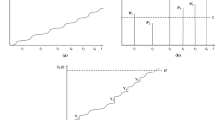Abstract
In this paper, an uncertain competing failure degradation model is proposed, in which the natural degradation process is described by an uncertain process, the time interval of shocks arrival and the size of the shocks have independent and nonidentical uncertainty distributions, respectively. The parameters in the distributions are uncertain variables. The belief reliability function and the mean time to failure of the system under three different shock models are studied according to uncertainty theory, and Micro-Electro-Mechanical System as an example is used to explain the developed models.






Similar content being viewed by others
Explore related subjects
Discover the latest articles and news from researchers in related subjects, suggested using machine learning.References
Cao XR, Hu LM, Li ZZ (2019) Reliability analysis of discrete time series–parallel systems with uncertain parameters. J Ambient Intell Hum Comput 10:2657–2668
Faulin J, Juan Perez AA, Martorell Alsina SS, Ramirez–Marquez JE (2010) Simulation methods for belief reliability and availability of complex systems. Springer, Berlin
Finkelstein M, Cha JH (2013) Stochastic modeling for reliability. Springer, London
Gao JW, Yao K, Zhou J, Ke H (2018) Reliability analysis of uncertain weighted k-out-of-n systems. IEEE Trans Fuzzy Syst 26(5):2663–2671
Guan Q, Tang YC, Xu AC (2016) Objective Bayesian analysis accelerated degradation test based on Wiener process models. Appl Math Model 40(4):2743–2755
Hao SH, Yang J, Ma XB, Zhao Y (2017) Reliability modeling for mutually dependent competing failure processes due to degradation and random shocks. Appl Math Model 51:232–249
Huang W, Askin R (2003) Reliability analysis of electronic devices with multiple competing failure modes involving performance aging degradation. Qual Reliab Eng Int 19(3):241–254
Huang W, Askin RG (2004) A generalized SSI reliability model considering stochastic loading and strength aging degradation. IEEE Trans Reliab 53(1):77–82
Jiang L, Feng QM, Coit DW (2015) Modeling zoned shock effects on stochastic degradation in dependent failure processes. IIE Trans 47(5):460–470
Keedy E, Feng QM (2012) A physics-of-failure based reliability and maintenance modeling framework for stent deployment and operation. Reliab Eng Syst Saf 103:94–101
Klutke GA, Yang YJ (2002) The availability of inspected systems subject to shocks and graceful degradation. IEEE Trans Reliab 51(3):371–374
Li WJ, Pham AH (2005) An inspection-maintenance model for systems with multiple competing processes. IEEE Trans Reliab 54(2):318–327
Liu BD (2007) Uncertainty theory, 2nd edn. Springer, Berlin
Liu BD (2008) Fuzzy process, hybrid process and uncertain process. J Uncertain Syst 2:3–16
Liu BD (2009) Some research problems in uncertainty theory. J Uncertain Syst 3(1):3–10
Liu BD (2010a) Uncertainty theory: a branch of mathematics for modeling human uncertainty. Springer, Berlin
Liu BD (2010b) Uncertain risk analysis and uncertain reliability analysis. J Uncertain Syst 4(3):163–170
Liu BD (2012) Why is there a need for uncertainty theory. J Uncertain Syst 6(1):3–10
Liu BD (2013a) Toward uncertain finance theory. J Uncertain Syst Appl 1(1):1–15
Liu BD (2013b) Extreme value theorems of uncertain process with application to insurance risk model. Soft Comput 17:549–556
Liu YH, Ha MH (2010) Expected value of function of uncertain variables. J Uncertain Syst 4(3):181–186
Liu L, Li XY, Sun FQ, Wang N (2016) A general accelerated degradation model based on the Wiener process. Materials 9(12):981–1000
Liu ZC, Hu LM, Liu SJ, Wang YY (2020) Reliability analysis of general systems with bi-uncertain variables. Soft Comput 24:6975–6986
Lu CJ, Meeker WO (1993) Using degradation measures to estimate a time-to-failure distribution. Technometrics 35(2):161–174
Pan ZQ, Balakrishnan N (2011) Reliability modeling of degradation of products with multiple performance characteristics based on gamma processes. Reliab Eng Syst Saf 96(8):949–957
Peng H, Feng QM, Coit DW (2010) Reliability and maintenance modeling for systems subject to multiple dependent competing failure processes. IIE Trans 43(1):12–22
Rackwitz R (2001) Belief reliability analysis—a review and some perspectives. Struct Saf 23(4):365–395
Rafiee K, Feng QM, Coit DW (2014) Reliability modeling for dependent competing failure processes with changing degradation rate. IIE Trans 46(5):483–496
Rafiee K, Feng QM, Coit DW (2017) Reliability analysis and condition-based maintenance for failure processes with degradation-dependent hard failure threshold. Qual Reliab Eng Int 33(7):1351–1366
Sheng YH, Ke H (2020) Reliability evaluation of uncertain k-out-of-n systems with multiple states. Reliab Eng Syst Saf 195:106696. https://doi.org/10.1016/j.ress.2019.106696
Song SL, Coit DW, Feng QM, Peng H (2014) Reliability analysis for multiple-component systems subject to multiple dependent competing failure processes. IEEE Trans Reliab 63(1):331–345
Tanner DM, Walraven JA, Helgesen K, Irwin Lw, Brown F, Smith NF and Masters N (2000) MEMS reliability in shock environments. In: IEEE International reliability physics symposium proceedings. 38th Annual (Cat. No. 00CH37059). San Jose, CA, USA, pp 129–138
Wang GJ, Zhang YL (2005) A shock model with two-type failures and optimal replacement policy. Int J Syst Sci 36(4):209–214
Wang J, Bai GH, Li ZG, Zuo MJ (2020a) A general discrete degradation model with fatal shocks and age-and-state-dependent nonfatal shocks. Reliab Eng Syst Saf 193:106648. https://doi.org/10.1016/j.ress.2019.106648
Wang J, Li ZG, Bai GH, Zuo MJ (2020b) An improved model for dependent competing risks considering continuous degradation and random shocks. Reliab Eng Syst Saf 193:106641. https://doi.org/10.1016/j.ress.2019.106641
Ye ZS, Xie M (2015) Stochastic modelling and analysis of degradation for highly reliable products. Appl Stochast Models Bus Ind 31(1):16–32
Zeng ZG, Wen ML, Kang R (2013) Belief reliability: a new metrics for products reliability. Fuzzy Optim Decis Making 12:15–27
Zeng ZG, Kang R, Wen ML, Zio E (2017) A model-based reliability metric considering aleatory and epistemic uncertainty. IEEE Access 5:15505–15515
Zeng ZG, Kang R, Wen ML, Zio E (2018) Uncertainty theory as a basis for belief reliability. Inf Sci 429:26–36
Acknowledgements
This research is supported by the National Natural Science of China under Grants no. 71601101, Scientific and Technological Innovation Programs of Higher Education Institutions in Shanxi (2020L0463, 2019L0738).
Author information
Authors and Affiliations
Corresponding author
Additional information
Publisher's Note
Springer Nature remains neutral with regard to jurisdictional claims in published maps and institutional affiliations.
Rights and permissions
About this article
Cite this article
Shi, H., Wei, C., Zhang, Z. et al. Belief reliability analysis of competing for failure systems with bi-uncertain variables. J Ambient Intell Human Comput 12, 10651–10665 (2021). https://doi.org/10.1007/s12652-020-02878-z
Received:
Accepted:
Published:
Issue Date:
DOI: https://doi.org/10.1007/s12652-020-02878-z



